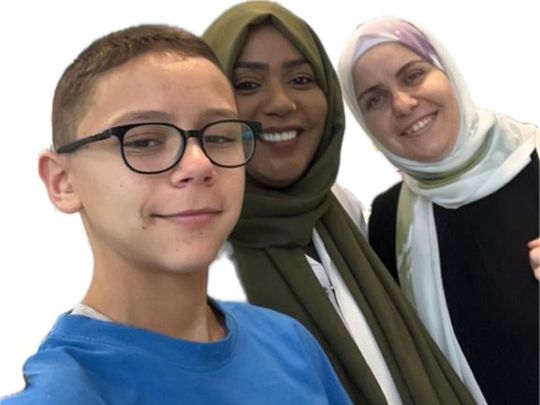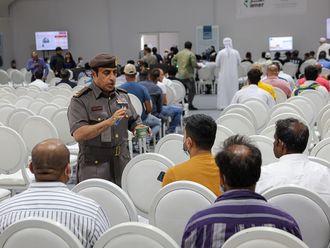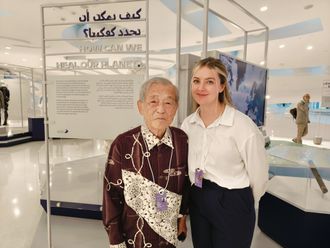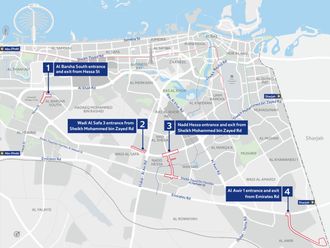
Abu Dhabi: A problem shared is said to be a problem halved, and this is certainly true in the case of Diabetes Heroes, a support group run by the Imperial College London Diabetes Centre (ICLDC) Abu Dhabi.
Initially set up in 2017, the group, which boasts over 200 members, aims to educate individuals newly diagnosed with diabetes, while also providing support to diabetics and their families to share their concerns and learn from others.
“We felt the name was a good representation of somebody living with diabetes – we feel that they are heroes, and they go through life with the challenge of diabetes, and we just wanted to make them feel validated, appreciated and supported,” said Dr Amani Taha Osman, Consultant Paediatric Diabetologist at ICLDC, ahead of World Diabetes Day on November 14.
Dr Amani said the support group is an extension of the care given to patients during ICLDC clinic visits. In addition to patients, the support group includes healthcare professionals like educators and dieticians, thus empowering patients to manage their condition effectively.
Individuals who are newly diagnosed with diabetes are introduced to the Diabetes Heroes WhatsApp group creating an immediate forum of support. The WhatsApp group also serves as a 24-hour helpline for troubleshooting issues related to using devices such as continuous glucose monitors, and for addressing urgent concerns.
“Many times, I wake up in the morning and check the WhatsApp group, only to find that there was a problem in the middle of the night. The issue would have been resolved by one of the experienced mothers who has gone through something similar, who either provided advice on what to do or directed the questioner to the appropriate resources for help,” Dr Amani said.
Out-of-clinic activities
“We educate the patients and give them the correct information on how to take care of their diabetes. Whenever we have a newly diagnosed diabetic who has issues coming to terms with their diagnosis, we introduce them to both the support group and the WhatsApp group so they feel there is a community behind them that can support them. This is the kind of atmosphere that we want. It’s to help empower the person who has to live with diabetes,” the doctor added.
For its child members, the support group specifically organises trips and activities to create an encouraging environment, and to strengthen friendships. The group also works to ensure that patients do not feel alone in dealing with their diabetes. This helps reduce social stigma, especially among teenagers.
Additionally, the support group provides mentoring by experienced patients, which helps guide newly diagnosed individuals through the learning curve and boosts their confidence.
One of the key aspects of the support group is that it brings together patients with diabetes in an environment where they can bond, share experiences and feel a sense of camaraderie. This is particularly beneficial for those living in remote areas.
Dr Amani said: “I believe in the importance of this platform for patients who are newly diagnosed. Seeing the amount of support they need, particularly with Type 1 diabetes, and considering how advanced technology is nowadays with its steep learning curves, they can easily feel overwhelmed while learning how to manage injections and dealing with other associated challenges. By connecting them with experienced patients who have diabetes, they can be mentored through this stage until they gain more confidence.”
Need for reassurance
The support group has had a positive impact on many. Miran Sami Maabreh, whose young son Hashem Al Refai, was diagnosed with Type 1 diabetes, is an example. Miran says the group provided much relief, support and guidance during challenging times.
“My son Hashem was just two years old when he was diagnosed. We were shocked, and it was a very difficult time, especially as we were alone here, away from our family back in our home country. When we went to the centre, I was eager to hear if there was another case like Hashem’s to help me. I also needed reassurance to help me manage my son’s condition, which calls for multiple injections and careful dietary management throughout the day. Dr Amani promptly found a case like ours and invited the family to share their experience and learnings with us. This was a huge relief, and it truly empowered us to manage Hashem’s diabetes,” Maabreh said.
Dr Amani emphasised the nature of the support group, where everyone cares for each other like a close-knit family. The focus is on portraying diabetes not as a disease but as a manageable condition. Overall, the support group has been successful in providing a holistic approach to diabetes care, which empowers patients to embrace their condition and live fulfilling lives.
“It is truly a safe space where people feel welcome. In fact, every time we have someone new join us, we receive the opportunity to have an immeasurable beneficial impact on another life,” the doctor said.








